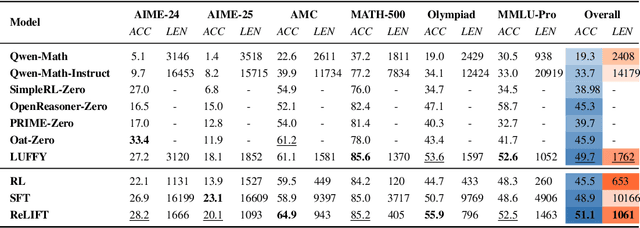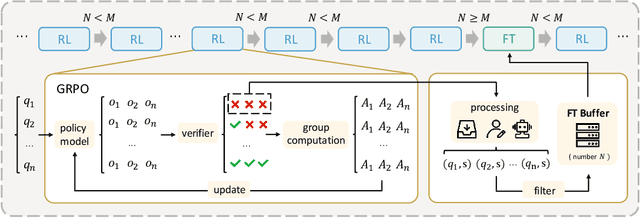Zhen Hao Wong
DataFlow: An LLM-Driven Framework for Unified Data Preparation and Workflow Automation in the Era of Data-Centric AI
Dec 18, 2025Abstract:The rapidly growing demand for high-quality data in Large Language Models (LLMs) has intensified the need for scalable, reliable, and semantically rich data preparation pipelines. However, current practices remain dominated by ad-hoc scripts and loosely specified workflows, which lack principled abstractions, hinder reproducibility, and offer limited support for model-in-the-loop data generation. To address these challenges, we present DataFlow, a unified and extensible LLM-driven data preparation framework. DataFlow is designed with system-level abstractions that enable modular, reusable, and composable data transformations, and provides a PyTorch-style pipeline construction API for building debuggable and optimizable dataflows. The framework consists of nearly 200 reusable operators and six domain-general pipelines spanning text, mathematical reasoning, code, Text-to-SQL, agentic RAG, and large-scale knowledge extraction. To further improve usability, we introduce DataFlow-Agent, which automatically translates natural-language specifications into executable pipelines via operator synthesis, pipeline planning, and iterative verification. Across six representative use cases, DataFlow consistently improves downstream LLM performance. Our math, code, and text pipelines outperform curated human datasets and specialized synthetic baselines, achieving up to +3\% execution accuracy in Text-to-SQL over SynSQL, +7\% average improvements on code benchmarks, and 1--3 point gains on MATH, GSM8K, and AIME. Moreover, a unified 10K-sample dataset produced by DataFlow enables base models to surpass counterparts trained on 1M Infinity-Instruct data. These results demonstrate that DataFlow provides a practical and high-performance substrate for reliable, reproducible, and scalable LLM data preparation, and establishes a system-level foundation for future data-centric AI development.
Learning What Reinforcement Learning Can't: Interleaved Online Fine-Tuning for Hardest Questions
Jun 09, 2025



Abstract:Recent advances in large language model (LLM) reasoning have shown that sophisticated behaviors such as planning and self-reflection can emerge through reinforcement learning (RL). However, despite these successes, RL in its current form remains insufficient to induce capabilities that exceed the limitations of the base model, as it is primarily optimized based on existing knowledge of the model rather than facilitating the acquisition of new information. To address this limitation, we employ supervised fine-tuning (SFT) to learn what RL cannot, which enables the incorporation of new knowledge and reasoning patterns by leveraging high-quality demonstration data. We analyze the training dynamics of RL and SFT for LLM reasoning and find that RL excels at maintaining and improving performance on questions within the model's original capabilities, while SFT is more effective at enabling progress on questions beyond the current scope of the model. Motivated by the complementary strengths of RL and SFT, we introduce a novel training approach, \textbf{ReLIFT} (\textbf{Re}inforcement \textbf{L}earning \textbf{I}nterleaved with Online \textbf{F}ine-\textbf{T}uning). In ReLIFT, the model is primarily trained using RL, but when it encounters challenging questions, high-quality solutions are collected for fine-tuning, and the training process alternates between RL and fine-tuning to enhance the model's reasoning abilities. ReLIFT achieves an average improvement of over +5.2 points across five competition-level benchmarks and one out-of-distribution benchmark compared to other zero-RL models. Furthermore, we demonstrate that ReLIFT outperforms both RL and SFT while using only 13\% of the detailed demonstration data, highlighting its scalability. These results provide compelling evidence that ReLIFT overcomes the fundamental limitations of RL and underscores the significant potential.
LogicPuzzleRL: Cultivating Robust Mathematical Reasoning in LLMs via Reinforcement Learning
Jun 05, 2025Abstract:Large language models (LLMs) excel at many supervised tasks but often struggle with structured reasoning in unfamiliar settings. This discrepancy suggests that standard fine-tuning pipelines may instill narrow, domain-specific heuristics rather than fostering general-purpose thinking strategies. In this work, we propose a "play to learn" framework that fine-tunes LLMs through reinforcement learning on a suite of seven custom logic puzzles, each designed to cultivate distinct reasoning skills such as constraint propagation, spatial consistency, and symbolic deduction. Using a reinforcement learning setup with verifiable rewards, models receive binary feedback based on puzzle correctness, encouraging iterative, hypothesis-driven problem solving. We demonstrate that this training approach significantly improves out-of-distribution performance on a range of mathematical benchmarks, especially for mid-difficulty problems that require multi-step reasoning. Analyses across problem categories and difficulty levels reveal that puzzle training promotes transferable reasoning routines, strengthening algebraic manipulation, geometric inference, and combinatorial logic, while offering limited gains on rote or highly specialized tasks. These findings show that reinforcement learning over logic puzzles reshapes the internal reasoning of LLMs, enabling more robust and compositional generalization without relying on task-specific symbolic tools.
Let's Verify Math Questions Step by Step
May 20, 2025Abstract:Large Language Models (LLMs) have recently achieved remarkable progress in mathematical reasoning. To enable such capabilities, many existing works distill strong reasoning models into long chains of thought or design algorithms to construct high-quality math QA data for training. However, these efforts primarily focus on generating correct reasoning paths and answers, while largely overlooking the validity of the questions themselves. In this work, we propose Math Question Verification (MathQ-Verify), a novel five-stage pipeline designed to rigorously filter ill-posed or under-specified math problems. MathQ-Verify first performs format-level validation to remove redundant instructions and ensure that each question is syntactically well-formed. It then formalizes each question, decomposes it into atomic conditions, and verifies them against mathematical definitions. Next, it detects logical contradictions among these conditions, followed by a goal-oriented completeness check to ensure the question provides sufficient information for solving. To evaluate this task, we use existing benchmarks along with an additional dataset we construct, containing 2,147 math questions with diverse error types, each manually double-validated. Experiments show that MathQ-Verify achieves state-of-the-art performance across multiple benchmarks, improving the F1 score by up to 25 percentage points over the direct verification baseline. It further attains approximately 90% precision and 63% recall through a lightweight model voting scheme. MathQ-Verify offers a scalable and accurate solution for curating reliable mathematical datasets, reducing label noise and avoiding unnecessary computation on invalid questions. Our code and data are available at https://github.com/scuuy/MathQ-Verify.
Multi-Agent Collaborative Data Selection for Efficient LLM Pretraining
Oct 10, 2024



Abstract:Efficient data selection is crucial to accelerate the pretraining of large language models (LLMs). While various methods have been proposed to enhance data efficiency, limited research has addressed the inherent conflicts between these approaches to achieve optimal data selection for LLM pretraining. To tackle this problem, we propose a novel multi-agent collaborative data selection mechanism. In this framework, each data selection method serves as an independent agent, and an agent console is designed to dynamically integrate the information from all agents throughout the LLM training process. We conduct extensive empirical studies to evaluate our multi-agent framework. The experimental results demonstrate that our approach significantly improves data efficiency, accelerates convergence in LLM training, and achieves an average performance gain of 10.5% across multiple language model benchmarks compared to the state-of-the-art methods.
Loss-aware Curriculum Learning for Heterogeneous Graph Neural Networks
Feb 29, 2024Abstract:Heterogeneous Graph Neural Networks (HGNNs) are a class of deep learning models designed specifically for heterogeneous graphs, which are graphs that contain different types of nodes and edges. This paper investigates the application of curriculum learning techniques to improve the performance and robustness of Heterogeneous Graph Neural Networks (GNNs). To better classify the quality of the data, we design a loss-aware training schedule, named LTS that measures the quality of every nodes of the data and incorporate the training dataset into the model in a progressive manner that increases difficulty step by step. LTS can be seamlessly integrated into various frameworks, effectively reducing bias and variance, mitigating the impact of noisy data, and enhancing overall accuracy. Our findings demonstrate the efficacy of curriculum learning in enhancing HGNNs capabilities for analyzing complex graph-structured data. The code is public at https: //github.com/LARS-research/CLGNN/.
Ensemble Learning for Graph Neural Networks
Oct 22, 2023Abstract:Graph Neural Networks (GNNs) have shown success in various fields for learning from graph-structured data. This paper investigates the application of ensemble learning techniques to improve the performance and robustness of Graph Neural Networks (GNNs). By training multiple GNN models with diverse initializations or architectures, we create an ensemble model named ELGNN that captures various aspects of the data and uses the Tree-Structured Parzen Estimator algorithm to determine the ensemble weights. Combining the predictions of these models enhances overall accuracy, reduces bias and variance, and mitigates the impact of noisy data. Our findings demonstrate the efficacy of ensemble learning in enhancing GNN capabilities for analyzing complex graph-structured data. The code is public at https://github.com/wongzhenhao/ELGNN.
 Add to Chrome
Add to Chrome Add to Firefox
Add to Firefox Add to Edge
Add to Edge